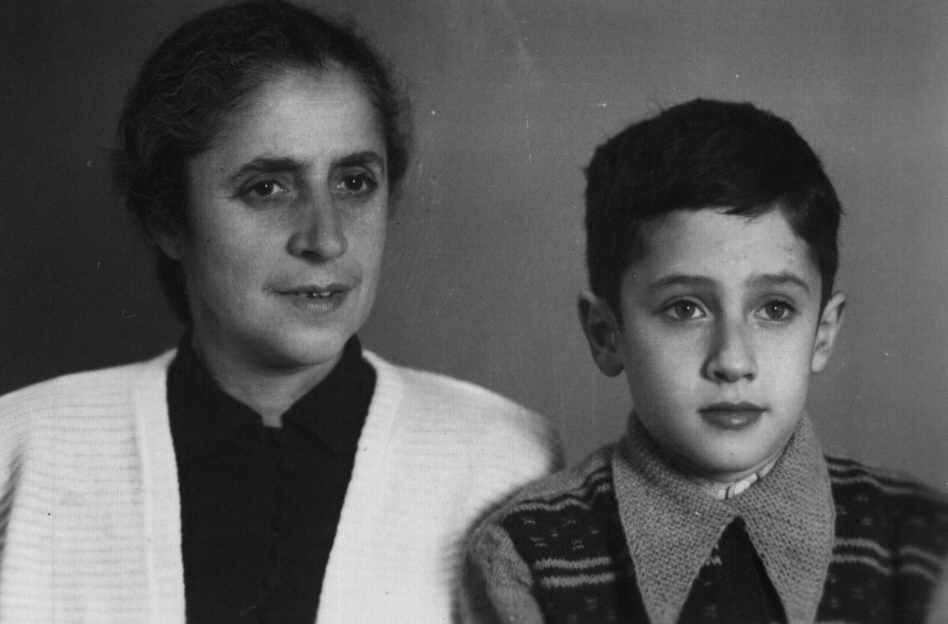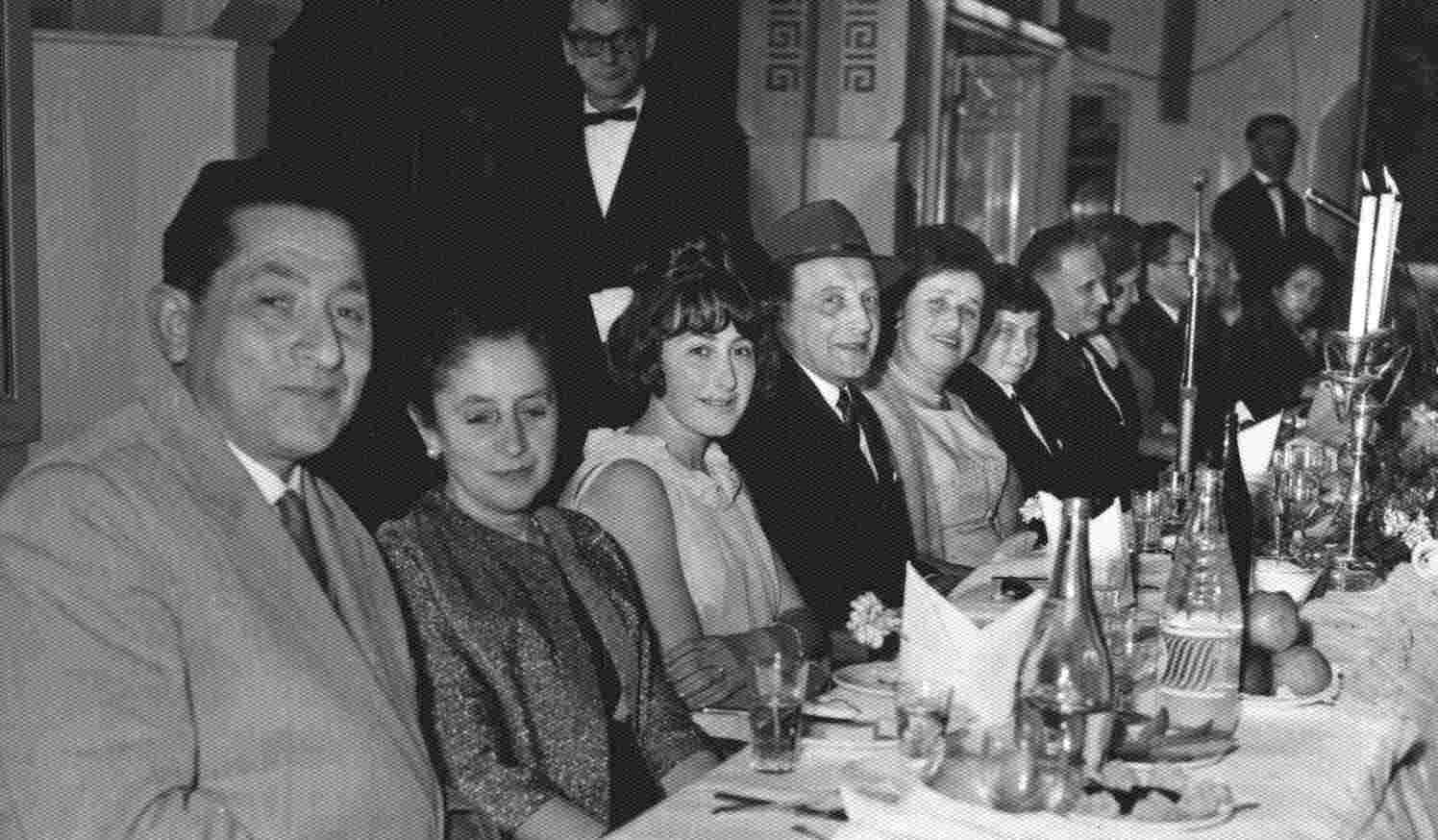
On arrival in Melbourne, Australia, we settled initially with the Cytrynowskis - Uncle Icek and Aunt Ruth and their two children - in their house in Brunswick. I was suddenly confronted by many relatives and their children. As well as the Cytrynowskis, there were the Zelwers - Uncle Haskiel and Aunt Mala, a cousin of my mothers, who had also survived the war in Poland - Aunt Mala's first husband and two children had perished in the Holocaust. She re-married soon after the war, and left for Australia with the Cytrynowskis. There they had two children. I needed to communicate with my four cousins, but I did not know any English, nor did they know any Polish. It did not help matters when my Aunt declared that she didn't want to hear me speak in Polish, the only language I knew, because it offended her. To understand each other my cousins and I reverted to the universal language we picked up by listening to our respective parents - Yiddish! We had never had formal education in Yiddish, but boon we were communicating quite fluently!
After a few months my parents and I left the Cytrynowskis' place and rented a dilapidated old weatherboard house in Fitzroy. The area between Fitzroy and Brunswick was one of the popular areas in Melbourne for Jews to settle in at the time. After initially going to a primary school in Brunswick I moved to Alfred Crescent State School in Fitzroy. My initial inability to understand the English language was soon swept aside, taking with it my initial homesickness for Poland.
Unfortunately migrating to Australia had a traumatic effect both on my mother and my father. My mother had lost her good friends - the "lager friends". There was no more Lola, no more Hanka, no more Pani Zelazowa, no more Nauczycielka... There were new friends - friends of the Cytrynowskis - but my mother never took to them the way she socialised with her own old friends.
I did not fully consider the enormity of the devastating effect migrating to Australia had on my father until many decades later - after his passing.
In Lodz, my father was the master craftsman. He would be the one noteworthy people went to, to get their custom shoe uppers designed and made. It was impossible to produce a shoe upper of a higher quality than that by my father. I could vouch for that, watching the finesse with which he cut and sewed the leather. Despite living and working in what was little more than a hovel, my father was in his environment - it was his paradise.
In Australia, the environment was different. People did not need custom-made shoe uppers; they did not have the time or patience to go to two places to get their footwear. They wanted to simply go to a shoe shop and buy them ready made.
My father's friends who also migrated, most of them in the same trade, perhaps because they were "solers" - their work resulting in a complete shoe; or perhaps because they had more initiative, soon set up their own businesses, usually one-man self contained factories. Some of these factories expanded to employing workers, some eventually becoming large shoe making businesses.
In Australia my father was no longer the master craftsman, having no clientele, being reduced to working for a wage for an employer who was usually another Jew who, on arriving in Australia, had established a shoemaking factory. Being able only to make shoe uppers made it difficult for my father to set up the type of business he was used to in Poland. My father still worked on his heavy-duty sewing machine from home, but now the master craftsman was reduced to earning a wage.
My mother was heavily involved in gluing and putting in eyelets while my father cut and sewed the leather, turning it into a completed upper.
With my father having no car to get around in, she would go on foot and by tram to his employer, bringing home rolls of leather and taking back packs of completed uppers. It may have contributed to the hunched back she developed later in life.
This was when my father's relationship with my mother began to break down. He blamed my mother for his misery - it was due to the exhortations of her relatives that he had left his beloved Poland and his beloved shoe business - it was due to that he was now obliged to earn a wage like a common worker.
My father could not get used to this lifestyle and was overcome with a desire to return to Poland - to his past profession; to his past clientele; to his friends... He did not accept that his friends and his lifestyle no longer existed there. Because of her superior knowledge of Polish, on my father's demands my mother spent countless hours writing letters to Polish authorities, pleading to let us return to Poland. Luckily for me our pleas were unsuccessful. Nevertheless my father agonised over his lost lifestyle, and the tension between my parents increased with time.
I myself pined for the friends I lost in Poland, ones I would never see again. Being a child, though, I soon got used to my new home - Australia.
We took on Australian citizenship and soon I went to high school. My Mother briefly went to a series of Migrant English education classes, where after only a few lessons she excelled in the language to the point of assisting other migrants in her class. Unfortunately the distance my mother had to walk to the school, plus the household chores, plus the help she gave my father in his trade decided for her that she could not continue. Her knowledge of English diminished, never to improve.


The tension between my mother and father increased. Having been prone to loud and explosive arguments even in Poland, my father's outbursts now became more and more frequent, my father now not only blaming my mother for having us leave Poland, but accusing her of not being forceful enough in helping him establish a business as did wives of others who succeeded.
Sadly, some of my father's so-called friends, probably in an effort to gain some advantage, added fuel to the fire by telling him what he wanted to hear, and aggravating my parents' relationship even further.
In 1964, after a particularly angry argument, my father walked out, yelling that everything between him and my mother was finished. We soon heard from friends that he had gone to Poland, but then he returned and bought an old double-storey house nearby in Fitzroy. It was also a hovel, and he set up his work machinery there. He demanded that my mother move in with him, but she refused. Because of fear, she agreed that my father would come for dinner each day. I stayed with my mother in the old rented house, visiting my father daily in his.
I left Fitzroy High School and found my first job at what was then called the Postmaster General's Department.
With our rented house fit only for demolition, the landlord asked us to find alternate accommodation, and soon my mother and I rented a flat only a few streets away. When my father found out, his visits stopped. After my mother and I moved to the new flat, my father started writing threatening letters, demanding money. He had left my mother with a share of his savings, and felt she had not deserved it. The letters became increasingly abusive and threatening, mostly aimed at my mother, but sometimes at me. One day my father broke into our flat, damaging the place, and police arrested him. Afterwards threats continued. Eventually, after further police intervention, my father stopped contacting us.
I have only briefly described the events surrounding my parents' marriage breakup. For me to delve into it here would be neither appropriate, nor interesting for the average reader. However unjustified he was in his actions towards my mother, I do believe my father genuinely felt he had been wronged, but was misguided by enemies he thought were his friends. Until the threats and violence started I loved him as any son possibly could.